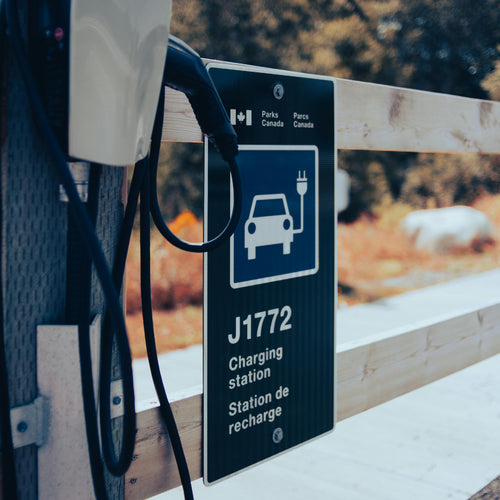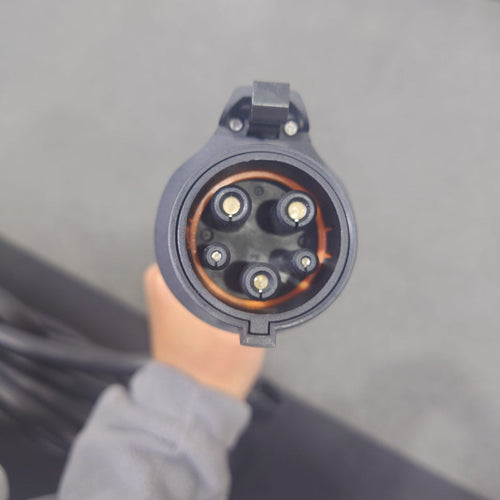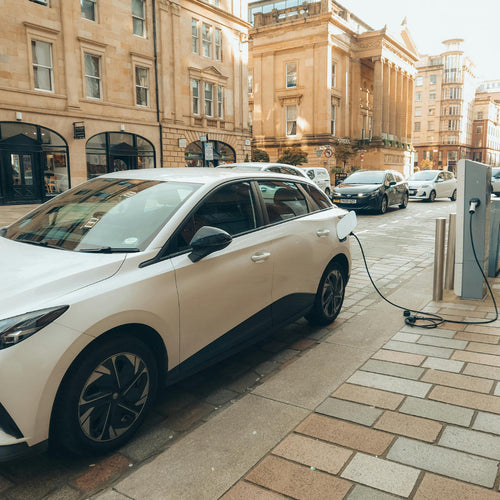Not all electric vehicle connectors are created equal. They vary in type, function, and regional compatibility. This article will introduce the J1772 Charger and the CCS charger, and explain the differences between them.
What Is a J1772 Charger?
A J1772 charger (J Plug) is a standard charging connector for electric vehicles. The J Plug, the J1772 connector, is the universal charging solution at all non-Tesla Level 1 and Level 2 charging stations in North America. All EV manufacturers, except Tesla, utilize the J Plug for charging. Tesla drivers can also use a J Plug, provided they have a Tesla to J1772 adapter.

What Is a CCS Charger?
The Combined Charging System (CCS) charging standard is an extension of the J1772 charging interface, building on its foundational five-pin design and adding two extra pins dedicated to DC fast charging. This ensemble of seven pins comprises three for AC charging (just like J1772) and adds two larger pins designed to handle high-power DC for fast charging.
J1772 vs CCS: What's the Difference?
J1772 and CCS are two different electric vehicle charging standards. The main difference is that J1772 supports Level 1 and Level 2 AC charging at home and public charging stations, but does not include DC fast charging; while CCS supports Level 1, Level 2 AC charging, and Level 3 DC fast charging.

Plug Design Difference
The J1772 connector is a five-pin system for electric vehicle charging, comprising two power pins for line and neutral, one ground pin for safety, and two communication pins for vehicle-station interaction. These pins guarantee safety, prevent disconnections during charging, and regulate power levels.
The CCS connector builds on the J1772 design by adding two large DC pins for high-current fast charging while retaining the original five J1772 pins for AC charging and communication. This combination enables CCS without issues with support for EV charging by AC or DC charging.
Charging Speed Difference
The SAE J1772 standard supports two levels of electric vehicle charging: Level 1 and Level 2.
- Level 1 charging, drawing power from a standard 120V AC outlet, provides up to 1.9 kW and adds 2-5 miles of range per hour.
- Level 2 charging, in contrast, operates at a higher voltage of 240V and can deliver up to 19.2 kW. According to the level 2 EV charger 10 kw review, it significantly increases the charging speed.

CCS charger is compatible with AC charging and DC fast charging. Charging speed with DC fast charging can vary based on the charging station's power rating and the EV's capabilities.
- CCS charging stations can provide different power levels, typically ranging from 50 kW to 350 kW or more.
- The highest-power stations can efficiently charge a compatible EV. CCS boosts EV charging percentage and time from 10% to 80% within a remarkable 30 minutes.
Cost Difference
The following table above outlines the cost differences associated with various electric vehicle (EV) charging types, highlighting the relative expense of each method.
|
Charging Type |
Cost Details |
|
J1772 Level 1 Charging |
Low |
|
J1772 Level 2 Charging |
middle |
|
CCS Level 2 Charging |
Higher |
|
DC Fast Chargers (DCFC) |
Highest |
How Much Does It Cost to Charge An EV By J1772 charger?
- The cost to charge an EVby level 1 charging is essentially nothing more than electricity, as it requires no additional equipment or installation. It is an economical option for those who don’t often drive long distances.
- The cost to charge an EV using a J1772 Level 2 plug includes the purchase of the equipment and installation. The best level 2 EV chargerinstallation depending on your home's electrical equipment.
- With the faster charging times and convenience, installing EV charger at homeis generally considered worth it. J1772 plug is the best home EV charger for everyday users.
- Some utility companies and government programs may offer rebates or incentives to help defray the installation cost of EV charging.
- The cost to charge an EV by Public J1772 charging stations is typically calculated per kilowatt-hour or per time of use.
- The cost of EV chargingis is generally more expensive than home charging.

How Much Does It Cost to Charge An EV By CCS charger?
FAQ: Can I Use J1772 Adapter on CCS Charger?
Conclusion
The J1772 connector offers a more seamless charging experience for non-Tesla electric vehicle owners, while Tesla vehicles can use J1772 chargers with an adapter. The difference between J1772 and CCS lies in their charging capabilities; J1772 focuses on AC charging, whereas CCS provides options for both AC and DC charging.
For those in the United States seeking the best Level 2 EV charger or the best home EV charger, understanding these differences is crucial. For instance, if a vehicle owner primarily requires AC charging, J1772 might be an economical and widely compatible choice. On the other hand, for those who need fast DC charging, CCS may be more suitable as it supports higher power levels and quicker charging times.










Leave a comment
This site is protected by hCaptcha and the hCaptcha Privacy Policy and Terms of Service apply.